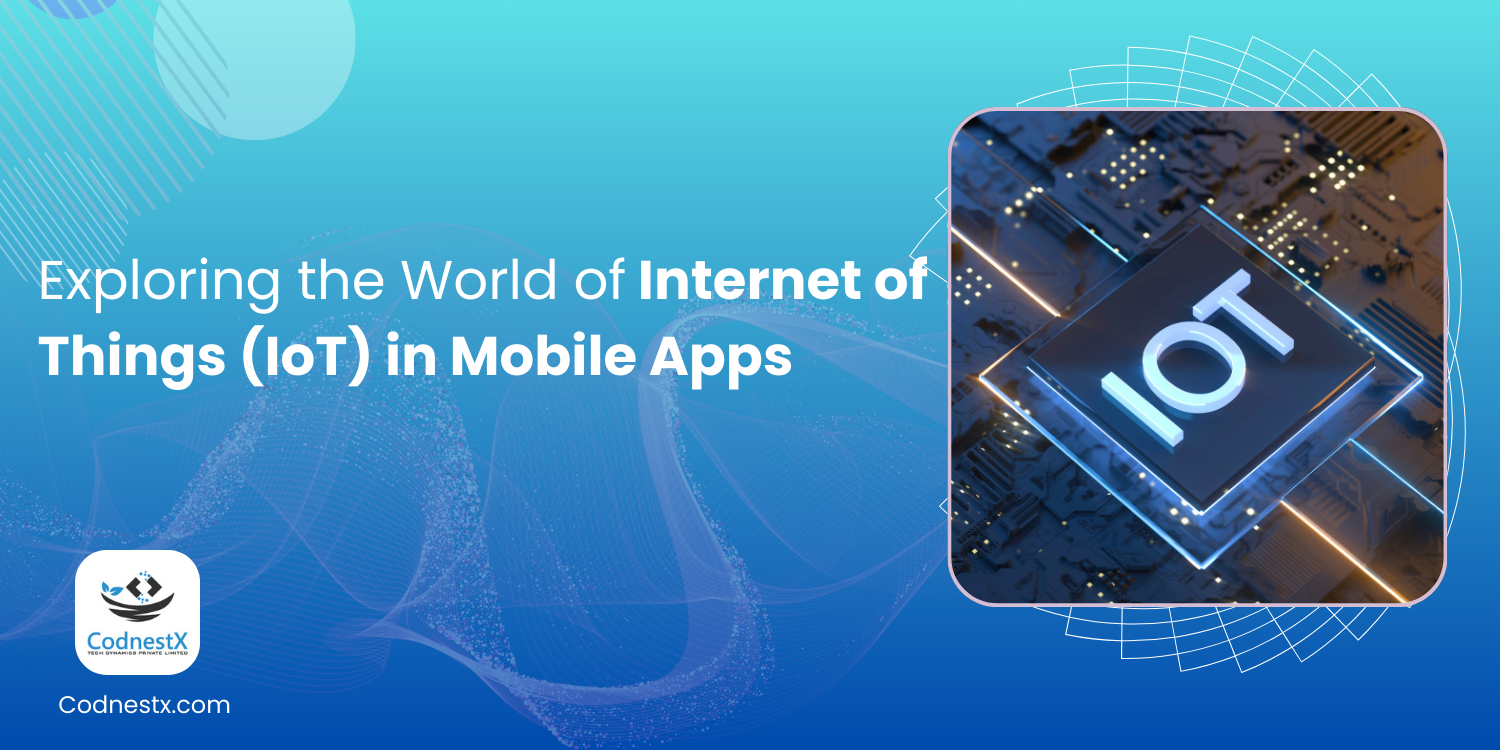Exploring the World of Internet of Things (IoT) in Mobile Apps
 CodnestX
CodnestX
What is IoT?
IoT refers to a network of interconnected devices that communicate with each other over the internet. These devices collect, analyze, and exchange data to perform specific tasks, making our lives more efficient and connected.
Think about your smartwatch tracking your fitness goals or your smart thermostat adjusting the temperature automatically. That’s IoT in action.
IoT and Mobile Apps: A Perfect Pair

Mobile apps act as a control hub for IoT devices. They allow users to interact with and control these devices remotely. For example, you can turn on your home’s lights from your office using an app. This seamless integration is what makes IoT and mobile apps a perfect match.
Key Components of IoT in Mobile Apps
Sensors: These are the devices that collect data, such as temperature, motion, or light.
Connectivity: IoT relies on networks like Wi-Fi, Bluetooth, or 5G to transmit data.
Data Analytics: Mobile apps analyze the data collected to provide insights or take actions.
Benefits of IoT Integration in Mobile Apps

Enhanced User Experience: Apps become smarter, offering personalized recommendations.
Efficiency: Automation reduces manual effort.
Real-Time Monitoring: Stay updated on everything from your health to your home’s security.
Popular Use Cases of IoT in Mobile Apps
Smart Homes
Apps allow users to control smart appliances, lighting, and security systems. Forgot to lock the door? No problem — your app’s got you covered.
Wearables
Fitness trackers and smartwatches collect health data, helping users monitor their fitness and well-being.
Healthcare
IoT-enabled apps are revolutionizing patient care with remote monitoring and personalized treatment plans.
IoT and Mobile App Development Challenges

While the possibilities are exciting, developers face hurdles like:
Security Risks: IoT devices are vulnerable to hacking.
Scalability: Handling large volumes of data requires robust infrastructure.
Compatibility: Ensuring that apps work seamlessly with various devices.
IoT in E-commerce Apps
IoT is redefining online shopping. Imagine your smart fridge notifying you when groceries are running low and placing an order automatically. This level of convenience enhances customer loyalty.
IoT in Healthcare Apps
From monitoring vital signs to enabling telemedicine, IoT is making healthcare more accessible and efficient. Mobile apps bridge the gap between patients and healthcare providers, offering real-time data and actionable insights.
IoT in Smart Cities

IoT-powered apps contribute to sustainable urban living. From managing traffic flow to monitoring air quality, these apps help create smarter cities.
IoT Protocols and Connectivity
IoT thrives on connectivity. Key protocols include:
Wi-Fi: For high-speed data transfer.
Bluetooth: Ideal for short-range communication.
5G Networks: Revolutionizing IoT with faster speeds and lower latency.
The Role of AI in IoT-powered Apps
Artificial Intelligence (AI) enhances IoT apps by enabling predictive analysis and automation. For instance, AI can learn user behavior and make adjustments automatically, like dimming lights when it’s bedtime.
IoT App Development: Best Practices
Prioritize security with encryption and regular updates.
Focus on user-friendly designs for seamless interaction.
Test extensively to ensure compatibility across devices.
Future Trends in IoT Mobile Apps

The future is exciting! Trends to watch include:
Edge Computing: Reducing latency by processing data closer to the source.
Voice Integration: IoT apps will increasingly rely on voice commands.
Interoperability: Ensuring devices and apps from different vendors work together seamlessly.
Conclusion
IoT is transforming mobile apps, making them smarter and more intuitive. As we move forward, the integration of IoT with mobile applications will unlock even greater possibilities, redefining industries and enhancing user experiences.
Connect with us for all your IT development needs! Let’s discuss how we can bring your ideas to life — sales@codnestx.com
#IoT #MobileApps #SmartTechnology #TechInnovation #IoTDevelopment #AIinIoT #AppDesign
FAQs
1. What is the main advantage of IoT in mobile apps?
IoT enhances functionality, offering real-time monitoring and automation that improve user experience.
2. What industries benefit most from IoT mobile apps?
Industries like healthcare, e-commerce, smart homes, and smart cities are seeing significant transformations.
3. How can developers address IoT security challenges?
Implementing encryption, regular updates, and secure authentication protocols can mitigate risks.
4. What is the role of 5G in IoT apps?
5G offers faster speeds and lower latency, enabling seamless communication between IoT devices.
5. How does AI enhance IoT mobile apps?
AI powers predictive analytics and automation, making apps smarter and more efficient.
Subscribe to my newsletter
Read articles from CodnestX directly inside your inbox. Subscribe to the newsletter, and don't miss out.
Written by

CodnestX
CodnestX
CodnestX specializes in digital transformation and software development services, offering advanced engineering solutions to elevate your business. Our expert team simplifies operations, engages audiences, and drives global change by turning your ideas into reality with cutting-edge technology. We excel in helping startups succeed and optimizing enterprise efficiency. With a dedicated team and a focus on innovation, we transform digital presences and achieve business goals. Discover how CodnestX can support your journey towards digital excellence. Explore our portfolio to see our innovative solutions in action.